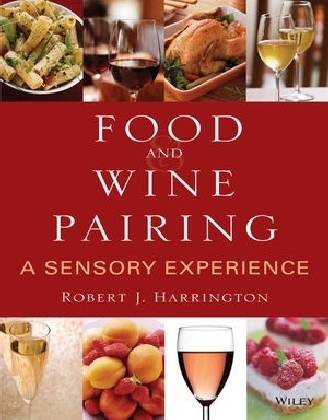
Food and Wine Pairing
John Wiley & Sons Inc (Verlag)
978-0-471-79407-3 (ISBN)
Dr. Robert Harrington is currently an associate professor at the School of Hospitality and Tourism Management at the University of Guelph. He recently transferred from Nicholls State University in May, 2005 where he served as Dean and Professor of Chef John Folse Culinary Institute for four years.
PREFACE xi
ACKNOWLEDGMENTS xiii
PART A: MASTERING THE ART AND SCIENCE OF FOOD AND WINE PAIRING 1
CHAPTER 1: THE WINE AND FOOD PYRAMID: A HIERARCHY OF TASTE 3
Introduction 4
Objectives of Food and Wine Pairing 4
Aperitif: The Italian Wine and Food Perspective 5
Food-and-Wine Pairing Mechanics: Matching Traditions 8
Overview of Book Methods 11
Key Elements of Wine and Food: A Hierarchical Perspective 11
Summary: Where Do We Go from Here? 13
Classic Italian Wine and Food Examples 14
CHAPTER 2: TASTE BASICS AND THE BASICS OF WINE EVALUATION 19
Introduction 20
Aperitif: Elements of Wine Service 20
Sensory Evaluation 22
Basics of Wine Evaluation 23
Setting Up a Tasting Session 27
The Art and Science of Wine Evaluation 28
Palate Mapping 31
Tasting Instructions 31
Summary 32
Exercises 33
CHAPTER 3: GASTRONOMIC IDENTITY: THE EFFECT OF THE ENVIRONMENT AND CULTURE ON PREVAILING COMPONENTS, TEXTURE, AND FLAVORS IN WINE AND FOOD 45
Introduction 46
Aperitif: How Should Menus and Wine Lists Be Organized? 47
The Environment 50
Wine: The Impact of Geography and Climate 50
Culture 56
History and Ethnic Diversity 56
Trial and Error, Innovations, and Capabilities 57
Gastronomic Identity 58
Old World and New World 58
Summary 61
Optional Exercises 62
CHAPTER 4: GASTRONOMIC IDENTITY II: FOOD AND CUISINE: THE EFFECT OF THE ENVIRONMENT AND CULTURE ON GASTRONOMY, WINE AND FOOD MARRIAGES, AND TOURISM 65
Introduction 66
Aperitif: Chef John Folse & Company 67
The Environment 78
Food: The Impact of Geography and Climate 79
Culture 80
History and Ethnic Diversity 81
Trial and Error, Innovations, and Capabilities 81
Gastronomic Identity 82
Old World and New World Wine and Food Marriages 83
Wine, Food, and Tourism 85
Summary 86
Exercises 87
PART B: THE FOUNDATION: WINE AND FOOD TASTE COMPONENTS 97
CHAPTER 5: THE IMPACT OF SWEETNESS AND ACIDITY LEVELS IN WINE AND FOOD 101
Introduction 102
Aperitif: Which to Choose First, Wine or Food? 102
The Impact of Sweetness Levels in Wine and Food 103
Sweetness Levels in Wine 103
Sweetness Levels in Food 104
Types of Sweeteners 105
Perceived Sweetness Levels 105
Interaction Between Wine and Food Sweetness 106
Acidity: From Flat to Tart (and Beyond) 107
Acidity Levels in Wine 107
Acidity Level Descriptions 108
Acidity Levels in Food 108
Interaction Between Wine and Food Acidity 109
Summary 111
Exercises 112
CHAPTER 6: SALT, BITTERNESS, AND BUBBLES 129
Introduction 130
Aperitif: Peller Estates Winery 130
Saltiness 131
Bitterness 132
Sparkling Wine and Pairing 133
Effervescence: The Great Equalizer? 136
Summary 137
Exercises 138
PART C: WINE AND FOOD TEXTURE CHARACTERISTICS 145
CHAPTER 7: WINE TEXTURE CHARACTERISTICS: TANNIN, OAK, AND BODY 149
Introduction 150
Aperitif: The Exemplary Nature of a Symbiosis Between Food Dishes and Cognacs 151
Texture in Wine 154
Tannin 155
Mouthfeel Wheel 155
Alcohol Level 156
The Impact of Oak 157
Overall Wine Body 157
Maturity, Micro-oxygenation, and Other Factors 159
Summary 160
Exercises 161
CHAPTER 8: FOOD TEXTURE CHARACTERISTICS: FATTINESS, COOKING METHOD, PROTEIN, AND BODY 167
Introduction 168
Aperitif: Canoe Restaurant and Bar 168
Fattiness in Food 169
Cooking Method and Protein Interactions 170
Overall Food Body 171
Interaction of Wine and Food Textures 172
Summary 172
Exercises 173
PART D: FLAVORS: ARCHITECTURAL ELEMENTS IN THE WINE AND FOOD PAIRING PROCESS 187
CHAPTER 9: THE IMPACT OF SPICE 189
Introduction 190
Aperitif: Bayou La Seine—An American Restaurant in Paris 190
Wine Varietals and Styles 193
Food Types and Styles 194
How Spice Is Assessed: Identifying Hot, Savory, or Sweet 195
Impact on Pairing Possibilities 198
Summary 200
Exercises 201
CHAPTER 10: FLAVOR INTENSITY AND FLAVOR PERSISTENCY 207
Introduction 208
Aperitif: Release Weekend Wine and Food Menu from On the Twenty 209
Identifying Flavor Types in Wine and Food 211
Food Flavor Categories 212
Wine Flavor Categories 213
Assessing Flavor Intensity 214
The Interaction of Wine and Food Flavor Intensity 215
Assessing Flavor Persistency 216
The Interaction of Wine and Food Flavor Persistency 217
Summary 218
Exercises 219
PART E: THE WHOLE ENCHILADA: PUTTING IT ALL TOGETHER 229
CHAPTER 11: MENU PLANNING: HORIZONTAL AND VERTICAL PAIRING DECISIONS 233
Introduction 234
Aperitif: Food and Wine of the Pacific Northwest 234
General Menu Planning Suggestions 237
Basic Wine Sequencing Recommendations 237
Pacific Northwest Menu 240
Wine and Food Pairing Instrument 249
Wine and Food Match Decision Tree 253
A Profiling Approach to Match Level Assessment 253
Summary 263
Exercises 264
CHAPTER 12: WINE AND CHEESE: A NATURAL AFFINITY? 269
Introduction 270
Aperitif: Cheese, an Inspiration and an Education 270
Wine and Cheese Pairing 271
Cheese Categories 273
Summary 280
Exercises 280
CHAPTER 13: THE GRAND FINALE: DESSERT AND DESSERT WINES 287
Introduction 288
Aperitif: Niagara’s Wine Region 288
Dessert Wine Categories 289
Dessert Selection and Wine Pairing 295
Dessert Categories 295
Summary 302
Exercises 303
CHAPTER 14: THE CUSTOMER EXPERIENCE: PRODUCT, SERVICE, AND TRAINING ISSUES 307
Introduction 308
Aperitif: Product-Service Considerations for a Food and Wine Program 308
The Total Experience: Creating Distinctive Food and Wine Capabilities 309
Wine and Food Training Process 310
Summary 311
Exercises 312
GLOSSARY 313
INDEX 317
| Erscheint lt. Verlag | 27.3.2007 |
|---|---|
| Zusatzinfo | Photos: 48 B&W, 0 Color; Drawings: 11 B&W, 0 Color; Maps: 0 B&W, 0 Color; Tables: 121 B&W, 0 Color |
| Verlagsort | New York |
| Sprache | englisch |
| Maße | 213 x 274 mm |
| Gewicht | 612 g |
| Themenwelt | Sachbuch/Ratgeber ► Essen / Trinken ► Getränke |
| ISBN-10 | 0-471-79407-4 / 0471794074 |
| ISBN-13 | 978-0-471-79407-3 / 9780471794073 |
| Zustand | Neuware |
| Haben Sie eine Frage zum Produkt? |
aus dem Bereich


